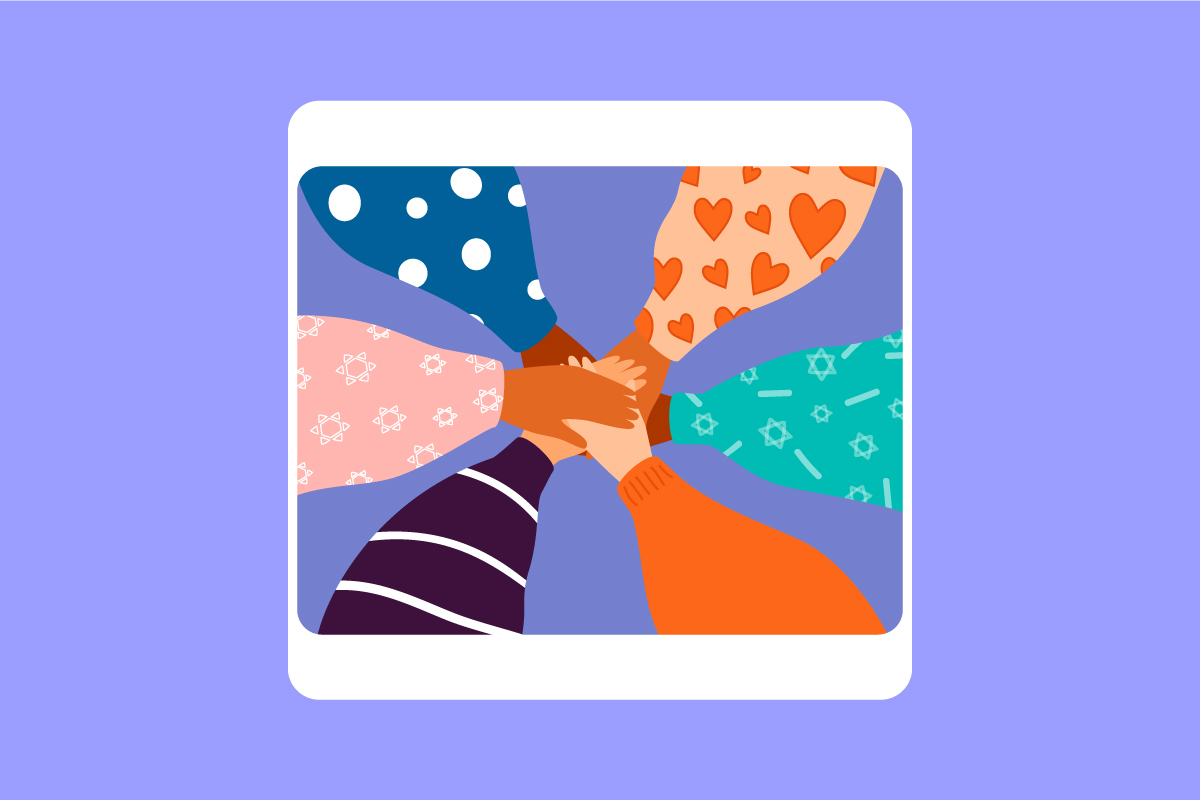Growing up, my family had not been affiliated with any synagogue. Like many vaguely secular Jewish families, we’d put up a menorah in the same room as the Christmas tree (or in my great-grandmother’s words, the “Hanukkah Bush”) and keep kosher when we didn’t feel like eating bacon.
Then, when I was 12, my mom made a decision: We were going to start going to synagogue. My mom found herself seeking out a diverse Jewish community. She had transitioned from Conservative Judaism to Reform but still struggled to find an environment where she felt totally comfortable as both a Jew and a Black woman. Consequently, I was raised divorced from any religious institution. But, finally, she found a synagogue in our neighborhood that was home to a diverse congregation.
Her vision was that we’d get to meet other Jews in the neighborhood, I’d have a bat mitzvah, and then, if everything went according to plan, I’d marry a nice Jewish lawyer of color. For prepubescent me, all this meant was that I now had to start waking up at 8 a.m. every Sunday to go to Hebrew school.
As a tween, I was coming late to the game. Every morning I felt humiliated. Elementary schoolers were talking about the Torah with ease, identifying an aleph or lamed like they had been studying for years — which, to be fair, they had. I was bored, the only other kids my age had already been bar or bat mitzvahed, and I dreaded going every weekend. Plus, once I got such bad stage fright at the Hebrew school talent show that I cried in front of the entire congregation.
Long story short, I dropped out of Hebrew school.
The experience distanced me from my local Jewish community. My mom went to services alone. I took “being Jewish” as a failed experiment. Then, as tends to happen when you are consumed by adolescence, life got hard. On the microscale, classmates got meaner, acne got redder, and relationships got more complicated. On the macro, mass shootings were increasing with a vengeance, climate change was getting harder to ignore, and the 2016 election compounded it all.
It was one of the first times in my life that I needed faith.
Toni Morrison once wrote, “If you are free, you need to free somebody else. If you have some power, then your job is to empower somebody else.”
I often think of this as a primary responsibility of tikkun olam. For me, I found my Jewish spirituality not based only around God, but rather based around faith in a better world, in equity, and in humanity’s capacity to love. As someone who is both Jewish and a BIPOC, I have been able to lean into this faith as an actionable way to process trauma.
So, as an adult, I found a congregation with whom I share these core values.
At Nefesh, an LA congregation that describes itself as “an open-hearted spiritual community welcoming all of the identities that make up who we are and who we love,” the rabbi offers blessings of endurance, gratitude, and justice. Her sermons are always intertwined with current events. During quarantined Zoom services, she never shied away from trauma. When she spoke of grief, it was collective: grief about lives lost in the pandemic, in antisemitic hate crimes, in the brutality of police violence.
Along with this, every Shabbat service features a moment where congregation members (whom we refer to as “kin”) speak about how they are helping the community. This isn’t limited to the Jewish community, but rather the broader Los Angeles area. One week, someone spoke about putting together hygiene kits for LA’s unhoused population. Another week highlighted those organizing for the adoption of the Reproductive Dignity for Incarcerated People Act. This past summer, the entire Nefesh community showed support for Black Lives by doing things like joining anti-racist coalitions and saying the Mourner’s Kaddish for George Floyd at an interfaith BLM rally.
Most importantly, my family and I have never felt othered during services. Calls for justice are never framed as “how can we help them,” which uses exclusionary language that Jews of Color have always found issues with. There is no distinction between one type of Jew or another. Nobody cares that I wasn’t bat mitzvahed. They don’t care that our family doesn’t keep kosher. They’ve never asked if my mom was “here with a friend.” All that matters is that our Judaism is based on radical inclusion.
It was here that my mom and I found what we had been looking for all these years: a Jewish space diverse not only in race, but ideology. I felt unconditionally welcomed.
Embracing differences in experiences can teach kin how faith, to a certain extent, transcends identity. It recognizes that Jews have, and continue to, endure as a people. It also recognizes how we can be grateful for the privileges that we are honored with today. Most importantly, it teaches us that we must love the world that we are trying to save, the people that we devote our lives to, and the faith that has guided us through devastating hardships. Otherwise, spirituality is limited to self-service.
As I have grown within the environment of a truly inclusive congregation, I have come to realize that my dedication to faith is inextricable to my dedication to social justice. Above all, it reminds me that, like religion, social justice requires faith: faith in a better world, faith in equity, and faith in humanity’s capacity to love.
Header image design by Grace Yagel. Original image by Ponomariova_Maria/getty images.



